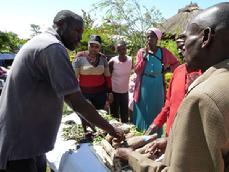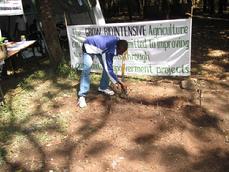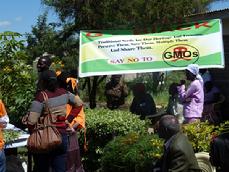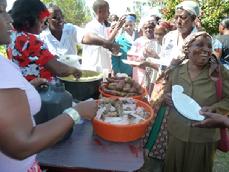BENEFITS OF
GROW BIOINTENSIVE TRAININGThe foundation of our program is restored and maintained organic soil fertility. The benefits to farmer-families and their communities affect almost every facet of their lives...Hunger alleviation: Poor production on family farms due to exhausted and eroded soil is a widespread cause of hunger and malnutrition. Biointensive techniques have been proven to increase food production from two to six times.Poverty relief: Families benefit economically because their highly productive gardens produce excess vegetables for market, while the cost of fertillizer and pesticide inputs is eliminated.Soil restoration: Diminishing soil fertility is an acute problem in East Africa. By growing and composting plants with a high content of carbon and nitrogen, Biointensive farmers restore and maintain soil fertility.
|
 |
| Teaching to diversify crops. |
|
|
 |
| Double-digging demonstration at Int'l Scout Moot. |
|
|
Water conservation: Biointensive techniques significantly reduce the amount of water needed to nurture crops by building porous, microbe-rich soil that can absorb and retain moisture. This makes it possible to maintain adequate supplies of food even in drought conditions.
Security: Reliable food supply stabilizes families and villages.
Nutrition and health: Organically grown, diverse crops improve family health due to better nutrition and the elimination of chemical fertilizers and pesticides.
Education: Families gain garden-based income and can afford to send their children to school. Children are healthier and can learn more effectively.
Strengthened community: Training programs are community-based. Villagers come together for training workshops and subsequently to share experience and exchange ideas. The circle widens as neighbors see the results and are attracted to learn GROW BIOINTENSIVE methods through farmer-to-farmer training.
|
 |
| Just say NO! |
|
|
 |
| Introducing new foods to diversify diet. |
|
|
HIV/AIDS: Trainings include an HIV/AIDS awareness component. Many communities are struggling to support HIV/AIDS-affected families, including widows and orphans. We provide Biointensive and nutrition training programs that help them to become more independent and food-secure and ease the burden on their communities.
Family planning: Trainers emphasize the connection between farm-plot size and family size. Nature-based farming methods make farmers aware of the “carrying capacity” of their small plots.
Women empowerment: About 2/3 of family farmers in Kenya are women. By raising the standard of living for their families, women gain improved gender status, both at home and in their community. Often, as they are relieved of the overwhelming burdens of problems like those above, a woman’s time and creativity are freed up to find more ways to improve quality of life for her family and community.
|
 |
| Teaching offset, close spacing of plants. |
|
|
|
|
|